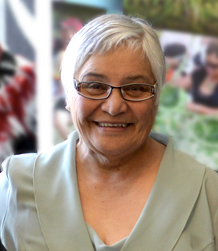From the E Tū Whānau Programme of Action 2013-2018.
 It is six years since we launched the first programme of action – E Tū Whānau Ora – a framework to help transform the serious impact of violence within whānau, hapū and iwi. E Tū Whānau was introduced as part of a government-wide commitment to family violence prevention. Within this context it was clear that the magnitude and serious nature of violence for whānau, hapū and iwi required particular attention; an urgent and fresh approach was needed that would make an enduring difference for our people.
It is six years since we launched the first programme of action – E Tū Whānau Ora – a framework to help transform the serious impact of violence within whānau, hapū and iwi. E Tū Whānau was introduced as part of a government-wide commitment to family violence prevention. Within this context it was clear that the magnitude and serious nature of violence for whānau, hapū and iwi required particular attention; an urgent and fresh approach was needed that would make an enduring difference for our people.
Whānau are the key
The original framework reflected the aspirations, experiences and commitment of Māori across Aotearoa – from iwi leaders to practitioners to whānau – and also offered a practical way forward.
“It was based on the premise that Māori must drive solutions and that these must be founded on kaupapa Māori and ways of working, but that government also had clear responsibilities. We have built on that approach, recognising that whānau are the key to eliminating violence.”
We all know that addressing family violence is complicated and takes time – there is no quick fix. Whānau violence is often intergenerational, and it will take time for violence to be unlearned. However, good progress has been made in the last five years. The E Tū Whānau approach is starting to bed in and this is reflected in different ways. The issue of whānau violence is now a regular agenda item for iwi leaders and the E Tū Whānau messages are being discussed on marae, around dinner tables and in prisons around Aotearoa. They are powerful messages and they are being taken to heart by Māori across the country.
Long-term commitment
Of course, this is a long-term commitment and process, and there is so much more to do. I truly believe that the opportunities for prevention and healing reside in kaupapa Māori practices. I am pleased to see that this second phase – E Tū Whānau (2013–18) – builds on the first Programme of Action but remains focused on the following:
- Māori-led solutions grounded in tikanga and based on whānau strength responsibility and accountability for positive change – from iwi, government and whānau community discussion and action, led and modelled by kahukura (community thought leaders).
Te mana kaha o te whānau!
I would like to congratulate the Māori Reference Group for their leadership and on-going commitment to this vital area of work. I look forward to enacting our vision and aspirations over these next five years – to ensure that whānau are strong, safe and prosperous, living with a clear sense of identity and cultural integrity and with control over their destiny – te mana kaha o te whānau!
Hon Tariana Turia, Associate Minister of Social Development
